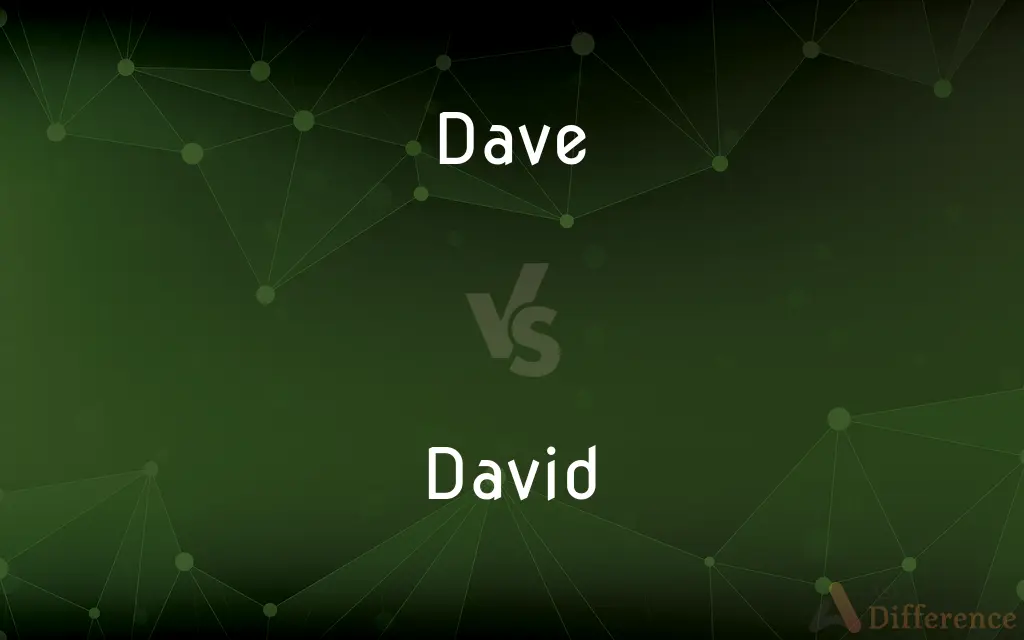Dave vs. David — What's the Difference?
Edited by Tayyaba Rehman — By Fiza Rafique — Updated on April 27, 2024
Dave is a common diminutive form of the name David, used informally or affectionately, whereas David is a full biblical name often used formally.

Difference Between Dave and David
Table of Contents
ADVERTISEMENT
Key Differences
Dave is typically used as a casual or familiar nickname for individuals named David. It is often preferred in informal settings such as social gatherings or among friends. On the other hand, David is the more formal version of the name, commonly found in official documents and formal introductions. It carries a traditional and sometimes religious significance, especially in Christian contexts.
While Dave gives a sense of friendliness and approachability, David projects a more serious and respectful image. This distinction makes David a preferred choice in professional and ceremonial occasions, whereas Dave is more likely chosen for casual interactions.
Dave, being a diminutive, suggests a closer relationship or less formality. This can influence how individuals bearing the name are perceived in social interactions. In contrast, using David can affect the level of formality in communication, often indicating a more distant or formal relationship.
The choice between Dave and David can also reflect personal identity or branding. For example, someone might use Dave in their personal life to seem more relatable, while they use David in their professional life to maintain a level of formality.
Comparison Chart
Formality
Informal, casual
Formal, official
ADVERTISEMENT
Usage Context
Social, friendly settings
Professional, legal documents
Connotation
Friendly, approachable
Serious, traditional
Relationship Implication
Implies closeness or familiarity
Suggests formality or distance
Cultural Significance
Less significant
Often biblical, historical significance
Compare with Definitions
Dave
Often used affectionately among peers or friends.
Dave, could you help me with this?
David
A biblical name, often used formally.
The certificate was issued to David Miller.
Dave
A shortened form of David, used informally.
Everyone calls him Dave at the party.
David
Suggests professionalism and respectability.
Dr. David Smith will be your surgeon.
Dave
Common in casual business names or personal brands.
Dave's Garage is just around the corner.
David
Preferred in legal and official documentation.
Please, address all correspondence to David Johnson.
Dave
Nickname conveying familiarity and approachability.
Dave's always the first to lend a hand.
David
Conveys a sense of tradition and formality.
David will be attending the conference as a speaker.
Dave
Informal variant popular in English-speaking cultures.
You'll find Dave listed under 'D' in my phone.
David
Used in official and historical contexts.
King David is a prominent figure in religious texts.
Dave
To assuage; soften; mitigate; relieve; calm; alleviate (pain).
David
David is described in the Hebrew Bible as king of the United Monarchy of Israel and Judah. In the Books of Samuel, David is a young shepherd who gains fame first as a musician and later by killing the giant Goliath, champion of the Philistines.
David
Patron saint of Wales (circa 520-600)
David
French neoclassical painter who actively supported the French Revolution (1748-1825)
David
(Old Testament) the 2nd king of the Israelites; as a young shepherd he fought Goliath (a giant Philistine warrior) and killed him by hitting him in the head with a stone flung from a sling; he united Israel with Jerusalem as its capital; many of the Psalms are attributed to David (circa 1000-962 BC)
Common Curiosities
Is Dave a common nickname outside of English-speaking countries?
Dave is predominantly used in English-speaking cultures, though similar diminutives exist elsewhere.
Does the use of Dave over David affect professional perception?
Yes, using Dave might project a more casual persona, whereas David is seen as more professional.
What is the origin of the name David?
The name David has biblical origins, historically linked to the second king of Israel.
Why do some people prefer to be called Dave?
They might prefer the familiarity and informality it conveys, making them appear more approachable.
Are there famous figures who prefer Dave to David?
Yes, many public figures known casually as Dave prefer this in social or public communications.
What are legal implications of using Dave instead of David?
Legally, it's important to use one's full name, David, in formal documentation.
Can Dave and David be used interchangeably?
Yes, but Dave is typically used in more casual or familiar contexts, while David is formal.
Does David have significant cultural meanings?
Yes, especially in religious contexts, representing leadership and strength.
Does the preference for Dave or David change with age?
Younger individuals might prefer Dave for its casualness, while older might stick to David for formality.
How do children typically learn to use Dave or David?
They may adopt Dave as they seek informality or friendliness among peers.
What impact does using David have in social situations?
It might set a more formal or distant tone compared to using Dave.
Share Your Discovery

Previous Comparison
Sentimental vs. Romantic
Next Comparison
Ventriloquism vs. VentriloquyAuthor Spotlight
Written by
Fiza RafiqueFiza Rafique is a skilled content writer at AskDifference.com, where she meticulously refines and enhances written pieces. Drawing from her vast editorial expertise, Fiza ensures clarity, accuracy, and precision in every article. Passionate about language, she continually seeks to elevate the quality of content for readers worldwide.
Edited by
Tayyaba RehmanTayyaba Rehman is a distinguished writer, currently serving as a primary contributor to askdifference.com. As a researcher in semantics and etymology, Tayyaba's passion for the complexity of languages and their distinctions has found a perfect home on the platform. Tayyaba delves into the intricacies of language, distinguishing between commonly confused words and phrases, thereby providing clarity for readers worldwide.












































